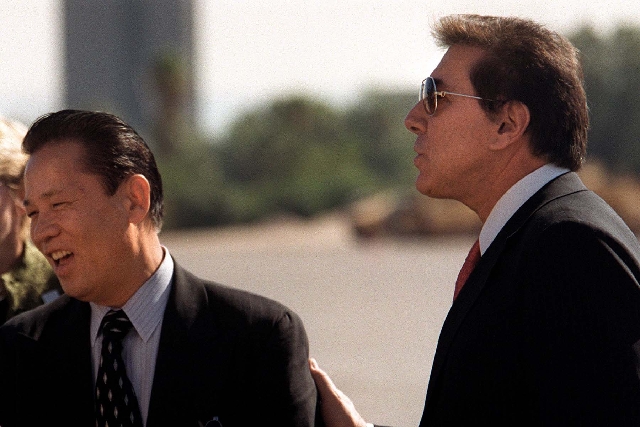Okada-Wynn feud escalates with release of new report
Allegations of misconduct used by Wynn Resorts Ltd. to oust a Japanese billionaire as a majority shareholder were based on a “deeply flawed” investigation that selectively used information to build a biased case, former Homeland Security chief Michael Chertoff said in 45-page report released Monday.
In the report prepared for businessman Kazuo Okada, Chertoff calls the earlier investigative report “structurally deficient, one-sided, and seemingly advocacy driven.”
A group led by former FBI Director Louis J. Freeh “cherry-picked evidence” that was “stretched to reach conclusions that would be helpful to the Wynn Resorts board,” Chertoff wrote in the report.
“The Freeh report’s factual findings and inferences lack objectivity and lack factual support,” Chertoff found. “Freeh’s law firm viewed itself as an advocate first and an impartial investigator second” in preparing the report.
In a statement, Okada said Chertoff’s report “confirms what I have maintained since the Freeh report was issued. ... It’s obvious that the biased report was part of Steve Wynn’s campaign to eliminate me as a rival to his power within Wynn Resorts.’’
A Wynn Resorts spokesman was unavailable for comment Sunday. The report was heavily redacted to eliminate references to information in Freeh’s report based on documents that Wynn declines to make public, Okada’s representatives said. The two gaming moguls have hired big guns in their ongoing legal battle over Okada’s investment in the global Wynn empire, which is pending in Clark County District Court.
Chertoff ran the Department of Homeland Security during President George W. Bush’s second term and is now senior counsel for the prestigious Washington, D.C., law firm Covington & Burling LLP.
Freeh was director of the FBI from 1993 to 2001, in both the Clinton and Bush administrations. He is now a partner at Philadelphia law firm Pepper Hamilton LLP, though his investigation of Okada was done by his earlier firm, Freeh, Sporkin & Sullivan LLP.
Freeh’s report was released on Feb. 18, 2012. On that same day, Wynn Resorts redeemed 24.54 million shares of Wynn Resorts stock owned by Aruze USA Inc., a company owned by Okada. At the time, Aruze USA was the largest shareholder in Wynn Resorts, holding almost 20 percent of the outstanding shares.
Wynn Resorts agreed to pay Okada $1.9 billion over 10 years for his 20 percent stake in the gaming company, an amount the company called “fair value.” Okada’s stake was worth an estimated $2.77 billion.
The company issued a $1.9 billion promissory note maturing in 2022 and carrying an annual interest rate of 2 percent. Okada said Wynn Resorts’ stock price gained $6.71, or 5.9 percent, the next day, providing Chairman Steve Wynn and the other directors with a tremendous financial gain.
Wynn Resorts’ board of directors said it moved to buy out Okada after Freeh’s investigation discovered alleged improper payments to foreign officials and that his involvement in Wynn Resorts could jeopardize the company’s domestic gaming licenses.
The report accused Okada of paying $110,000 to Philippine gaming regulators. Wynn Resorts accused Okada, who also owns Aruze’s parent company, Universal Entertainment Corp., of violating the U.S. Foreign Corrupt Practices Act and company policy by giving cash payment and gifts to foreign officials.
Okada’s Universal Entertainment has four casino licenses the Philippine Amusement & Gaming Corp. awarded in 2008 and 2009 to build and operate a Manila gambling and entertainment complex the government is developing to compete with Macau and Singapore.
Okada faces separate FBI and Philippines justice department probes into how the licenses were awarded.
Freeh’s investigation cited more than three dozen instances over a three-year period in which Okada and his associates engaged in improper activities for their own benefit in apparent violation of U.S. anti-corruption laws and gross disregard for the company’s code of conduct.
Wynn Resorts said last year the Freeh Report was the culmination of a yearlong investigation “based on increasing concerns the board had” about Okada and Aruze in the Philippines.
Chertoff said those conclusions were “based on an incomplete legal analysis; failure to collect evidence concerning most of the allegations; a disregard of evidence to undermine (Freeh’s) assumptions; and a failure to investigate plausible alternative explanations.”
Contact reporter Chris Sieroty at csieroty@reviewjournal
.com or 702-477-3893. Follow @sierotyfeatures on Twitter.






















